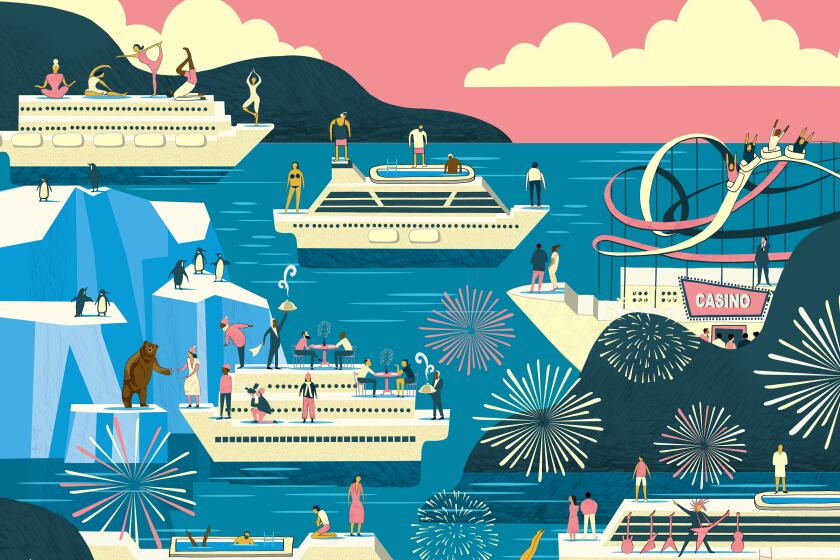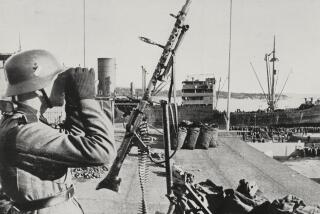On a Norway fiord cruise, nature unfolds on a grand, take-your-breath-away scale
I’ve never been fond of the view from a cruise ship balcony. Looking at the ocean all day is, well, monotonous. I always think I’m going to love it and will spend time on it but, except for sunrise and sunset, it’s boring.
Norway is an exception. The Scandinavian nation, which markets itself as “the most beautiful cruise destination in the world,” is among the most scenic places I’ve ever seen, edging out French Polynesia and Alaska.
I was mesmerized. Majestic fiords, Arctic tundra, tiny farms clinging to the side of mountains and waterfalls dropping thousands of feet down rocky cliffs slid by the ship on a seemingly endless loop.
And always, incredible clouds drifted across the sky — some puffy and white, some dark, some infused with bright patches where the sun shone through, sparkling on the sea.
I was on a 12-day cruise with friends, exploring Norway’s famous peaks and fiords aboard Regent Seven Seas Explorer. My group of six was among the 850,000 cruisers who visited Norway in 2019 as tourism booms there.
Why the rise in popularity? Thank Elsa, Anna and all things “Frozen.” The Disney film is credited with nearly doubling tourism in Norway since the first movie was released in 2013. Now “Frozen 2” and “Frozen the Broadway Musical” promise continuing growth, according to Visit Norway, the country’s tourism agency.
But Norway is more than a celluloid fable. It’s a country that does nature on a grand scale: The scenery is so wild and awe-inspiring that visitors sometimes are overwhelmed. At least, that was the consensus of my fellow cruisers when we toured Geirangerfjord, one of the country’s most beautiful fiords. It’s a UNESCO World Heritage Site, a deep-sea inlet that reaches nine miles into the heart of the country.
“I’m at a loss for words,” said Joel Brown of Aspen, Colo. “I live in the mountains, but this is so much more dramatic.”
We had docked in Geirangerfjord at 7 a.m. and jumped on a bus for a day of touring that took us high into the mountains on a narrow road full of hairpin turns. The many overlooks gave us the chance to take a closer look at the fiord far below. At Flydal Gorge, we could see our ship in the distance, now reduced to the size of a toy boat.
Some passengers chose to stay aboard, touring by ship only. Perhaps they were afraid of the winding road; I’m sure they didn’t regret their choice because they could see amazing things from the ship. But it couldn’t match our inland tour, which helped us sample the country and its people.
We passed waterside villages that lie in fairy-tale-like settings, hiked trails under a never-setting midnight sun and tasted goat cheese from farms that have been in families for generations. And high above the fiord, we climbed the Geiranger Skywalk to the 5,000-foot summit of Mt. Dalsnibba, where we found a panoramic view of the mountains.
Fiords — steep-sided inlets formed when glaciers retreat — can be seen in Alaska and Washington state, but aren’t common in the contiguous United States. I’ve seen them in both places and in New Zealand and thought they were beautiful. But something is different about Norway’s fiords, where ancient farmhouses and villages give a sense of continuity, isolation and serenity.
If you’re planning a cruise this year, here’s what you’ll find: a new ship with a tattoo parlor and another offering hand-rolled cigars; a roller coaster at sea; and a themed cruise inspired by “The Golden Girls.”
More than 1,100 dot its 36,122-mile coastline (California’s coast is 840 miles), one of the longest in the world. Fiords are the nation’s main draw; 100 cruise ships visited them last summer on more than 400 voyages.
I was worried that Norway’s increasing popularity would cause a cruise-ship logjam in some of its small ports. Our ship docked near the Disney Magic in Copenhagen at the beginning of our cruise, and I heard a rousing loudspeaker announcement: “Now let’s get the party going by having fun with Donald Duck and the beautiful Minnie Mouse.”
We sailed away and didn’t encounter the vessel again. We saw few other cruise ships during the trip.
Still, Norwegians are concerned that ships are getting bigger and their numbers are multiplying.
“When many ships and visitors arrive at the same time, it creates congestion, pollution and tension in many local communities along the coast,” state economic development agency
Innovation Norway wrote in a report that concluded that cruise tourists spend less money locally than other types of tourists.
But seeing the fiords by cruise ship or ferryboat is the best way to get an introduction to the country’s scenery. The busiest times, of course, are July and early August.
Bald eagles and black bears, Alaska cuisine and helicopter flightseeing are among the highlights you’ll experience on Alaska shore excursions.
My cruise visited nearly a dozen Norwegian gems — both communities and fiords — and ended in Oslo. The weather was ideal, the seas mostly calm, the ship plush.
Some of the country’s top destinations were on the itinerary:
Bergen, built on mountainsides overlooking the sea, is a UNESCO World Heritage City. Although it’s Norway’s second-largest city — only Oslo is larger— it has small-town charm and is known for its outdoor fish market and Bryggen waterfront buildings, which date to 1070.
Flam, one of the country’s busiest summer destinations, offers a 12-mile mountain railway journey that takes passengers through the beautiful landscapes of the innermost part of the Aurlandsfjord, an arm of the Sognefjord.
Harstad, the gateway to Norway’s Lofoten Islands, is the cultural capital of the north. Visitors often use it as a hub for island hopping by ferry.
Oslo is one of Europe’s fastest-growing areas. It has an urban vibe, world-class architecture and cutting-edge food, fashion and art. It also is home to the Nobel Peace Center.
The 4,000-passenger Panorama has enough activities to satisfy varied tastes — and places to get away from the din. It will sail to Mexican destinations each week.
Copenhagen was a highlight too. I arrived a couple of days early to get a closer look at this city of 17th and 18th century buildings, beautiful parks and ancient winding streets. Shopping was great, and I picked up some things for the cruise.
But prices here, as everywhere else in Scandinavia, were high. I struggled to find a hotel room for less than $500 a night.
Another downside of the trip: I wasn’t in Denmark or in any Norwegian city long enough to connect with its residents. I had to rely on tour guides for exposure to the region’s culture and people.
That’s not nearly as good as spending a week or more in a neighborhood or small community, but they give you a sample. And perhaps you’ll enjoy the area so much you’ll choose a land-based trip next time.
I learned a lot from a woman in Alesund, a port town on the west coast of Norway at the entrance to the Geirangerfjord.
The sun was shining as the guide spoke, but she wanted us to think ahead. “By the end of this month we’ll wake up one day and the hills will be covered in snow,” she said. “By the end of October, we may have snow down to sea level.”
She motioned to the sunny scene surrounding us. “It may be pleasant now, but you’re just lucky. What we don’t get in Norway is sunshine,” she said.
“That’s why we vacation as long as possible every year in Spain. Now that’s a sunny place.”
And so is Norway— if you get lucky,
We had sun almost every day of our 12-day voyage. It was a great time to have a balcony room — and worth every extra penny.
More to Read
Sign up for The Wild
We’ll help you find the best places to hike, bike and run, as well as the perfect silent spots for meditation and yoga.
You may occasionally receive promotional content from the Los Angeles Times.







